Helen Lowe's Blog, page 275
December 18, 2011
What I've Been Doing…
It was a great pleasure for me to post Nameless, a short story set in the Thornspell universe, on the blog last Friday, . Not just because it took somewhat longer to write than anticipated—life, as is it's wont, kept intervening in my short story ambitions—and so finally getting it posted gave me a real sense of accomplishment.
But I also enjoyed writing something for the simple reason that I had said I would and because it pleased me, rather than because I had a contract to do so, or was ...
December 17, 2011
What I'm Reading: "The Lieutentant" by Kate Grenville
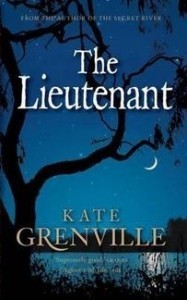 You may have noticed that I read a lot of speculative fiction—which is partly because I like it and partly because it's something of an occupational hazard when you're a speculative fiction author oneself: there's the need to keep up with what's new and with all the award lists. And then there are the interviews with other SFF writers: for me it's kind of a point of honour to actually read the books before I start asking questions. A little old fashioned perhaps, but there you have it …
You may have noticed that I read a lot of speculative fiction—which is partly because I like it and partly because it's something of an occupational hazard when you're a speculative fiction author oneself: there's the need to keep up with what's new and with all the award lists. And then there are the interviews with other SFF writers: for me it's kind of a point of honour to actually read the books before I start asking questions. A little old fashioned perhaps, but there you have it … 
But...
December 16, 2011
Just Arrived: "Not Saying Goodbye at Gate 21″ by Kathleen Jones
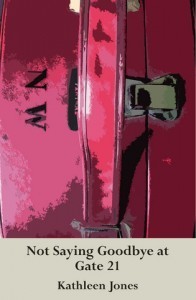 I've had a bit of a binge on buying poetry books lately and hope to get through reading a few of them over the Christmas-New Year break.
I've had a bit of a binge on buying poetry books lately and hope to get through reading a few of them over the Christmas-New Year break.
And I dearly wanted to buy this one by my fellow Tuesday Poet, Kathleen Jones, as I knew it was the award-winning manuscript from the Templar Poetry Prize last year.
It is a beautiful little book, too, with the lovely cover art and the French-style folded in flaps (I like them!) I can also tell you that I've had a sneak preview and love what I've seen—just...
December 15, 2011
Fun With Thornspell: "Nameless"—A Short Story For My Readers
Yesterday I provided the main introduction to today's feature short story, here, recapping the "Fun With Thornspell" event and my commitment to write a short story for the character named in the winning comment.
But to remind readers, Thornspell is a retelling of the story of Sleeping Beauty from the perspective of the prince destined to break the spell—but as with all such stories, there are others who come into it, such as Rue, the mute, mysterious young woman who manifests...
December 14, 2011
"Fun With Thornspell"—The "Rue" Short Story Here At Last!
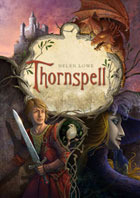 You may recall that way back in August/September—yes, I know, I can barely remember either!—I ran a "Fun With Thornspell" feature here on the blog.
You may recall that way back in August/September—yes, I know, I can barely remember either!—I ran a "Fun With Thornspell" feature here on the blog.
Here's how it worked: over the course of several weeks I asked readers to tell me the Thornspell character they would most like to have a standalone short story written for, or about—as well as why, based on that character's exploits in the Thornspell novel.
And because I did not want to be the one to have to choose, I also asked three judges to...
December 13, 2011
Plus Guest Post on SF-Signal—"Having Fun With Epic Fantasy: The Band of Brothers"
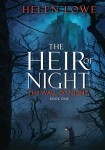 It's a day for featuring on other blogs—as well as the Orbit blog here, I have a guest post up on SF-Signal.
It's a day for featuring on other blogs—as well as the Orbit blog here, I have a guest post up on SF-Signal.
It's the next in my "Having Fun with Epic Fantasy" mini-series (the first was "Making the Grand Tour") and this one takes a look at "The Band of Brothers." Do check it out here—and feel free to leave a comment. We like comments! 
Ursula Bethell Residency Featured On the Orbit Blog
It was very nice to see my good news regarding the Ursula Bethell Creative New Zealand Residency in Creative Writing shared by my UK publisher, Orbit, on their blog today, here.
And those who check it out will have the bonus of a sneak preview of The Heir of Night's mass market cover—the UK mass market edition is due out on 19 January.
Urusla Bethell Residency Featured On the Orbit Blog
It was very nice to see my good news regarding the Ursula Bethell Creative New Zealand Residency in Creative Writing shared by my UK publisher, Orbit, on their blog today, here.
And those who check it out will have the bonus of a sneak preview of The Heir of Night's mass market cover—the UK mass market edition is due out on 19 January.
December 12, 2011
Tuesday Poem: "Sumer is Icumen In"
Loudly sing, cuckoo!
Grows the seed and blows the mead,
And springs the wood anew;
Sing, cuckoo!
Ewe bleats harshly after lamb,
Cows after calves make moo;
Bullock stamps and deer champs,
Now shrilly sing, cuckoo!
Cuckoo, cuckoo
Wild bird are you;
Be never still, cuckoo!
.
(Traditional)
—
About the Poem:
"Sumer is Icumen in" (or: 'Summer is a-coming in') is a traditional English round. It is thought to date from around 1260 AD and although written down the author is anonymous. There are several versions of the song, and given its era the original is written in Middle English. The version I use here is the one used in the 1973 film, The Wicker Man.
I have chosen to feature "Sumer is Icumen in" today because down here in the southern hemisphere, summer is indeed a-comin' in. But also because one thing I like to do in the Tuesday Poem slot, from time to time, is celebrate the origins and different traditions of poetry—all part of reaffirming that as poets we are part of a continuum, and I believe it's important to both appreciate and acknowledge that.
—
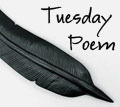 To read the featured poem on the Tuesday Poem Hub and other great poems from fellow Tuesday poets around the world, click here or on the Quill icon in the sidebar.
To read the featured poem on the Tuesday Poem Hub and other great poems from fellow Tuesday poets around the world, click here or on the Quill icon in the sidebar.
December 11, 2011
A Magical Mystery Tour Through "Men Briefly Explained"—& A Few Side Topics—With Author Tim Jones
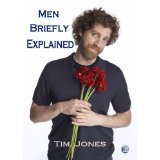 Helen: So here's the thing, Tim: do men need to be explained? And if so, to whom?
Helen: So here's the thing, Tim: do men need to be explained? And if so, to whom?
Tim: Maybe to themselves? Although it's been very noticeable that it has been predominantly women who have bought the book so far. More seriously, though (generalisations ahead — they may not be the last), while I think it's true that women suffer most from media stereotyping, men are affected by it too. Whether it's the Southern Man, the horndog, or the lovably incompetent father who is the staple of so much US situation comedy, men get forced into moulds. I am hereby joining the campaign for less mouldy men!
Helen: I'm totally for less mouldy men! But do you think more women are buying the collection because of the potential 'explanation'—or is it simply that more women buy and read poetry? I realise both questions may appear equally 'fraught' for the unwary poet but you're a brave man, Tim, so I'm interested in your answer.
Tim: Good question — I would have thought that more women buy and read poetry, but in most of the audiences on the book tour, the numbers of women and men appeared to be roughly equal. Likewise, most of the poets I know are women, yet some research by Janis Freegard suggests that in recent years more men than women have published poetry collections. I suggested that this might be skewed by age (i.e. more older poets are male, but most younger poets are female), but apparently the figures don't back this up either.
Where are these additional male poets, that's what I'd like to know — is there some inner sanctum, redolent of pipe tobacco and aged slippers, from which I have been excluded? Is there a password or a secret handshake of some kind? I'm eager to know.
Helen: I'll let you know if I hear anything, Tim! Meanwhile, as you explained in the Kay McKenzie Cooke interview, Men Briefly Explained is themed around men, reflecting both personal experience and your observation of others—but are there any secondary themes that you feel also shape the work?
Tim: I think the main secondary theme that emerges in the collection is that of aging. That was probably inevitable as soon as I decided to structure the collection roughly chronologically — it starts with two-year-old immigrant me and ends with ashes. (Humorous, life-affirming ashes, of course.) I think of the collection as flowing around my chronological age — the 'middle years' poems look outwards at other men, while the poems of youth and young manhood are more directly about me, and I guess both my Dad and I are in the DNA of the poems about old age.
Another secondary theme, which I never get very far away from in my work, is landscape, and especially the landscapes of Southland and Otago, where I grew up. These days, I sit at a chair in front of a computer, adding spread to my middle, while my poems dream of mountains.
Maybe a third one, too — the distance between self-image and reality.
Helen: It sounds as though there's a great deal in Men Briefly Explained to be explored. Your last poetry project was an anthology you co-edited with Mark Pirie, Voyagers: Science Fiction Poetry from New Zealand. You also write speculative prose. Do you think the relationship between speculative fiction and poetry is a strong one? Or would you deny that there is any special interaction?
Tim: I have two answers to that. (I have two answers to most things!) The first is that there is an active nexus between the two in the form of speculative poetry — that is, science fiction, fantasy and horror poetry. My two previous collections, Boat People and All Blacks' Kitchen Gardens, had whole sections devoted to speculative poetry, whereas there are only a couple of arguably speculative poems in Men Briefly Explained. But I have scratched my speculative poetry itch this year by editing an issue of the Science Fiction Poetry Association's online journal Eye to the Telescope, and I'd like to put together a chapbook or collection of speculative poetry at some point.
The second answer is that a lot of poetry poses "what if?" questions, overtly or covertly, and for me, "what if?" is the question at the heart of speculative fiction — science fiction most of all.
Helen: Is there any one poem in the collection that's a personal favourite? And if so, why?
Tim: Another interviewer on my blog tour asked me this. My answer then was Thinning, which is the poem you kindly posted on your blog as a Tuesday Poem — and that remains one of my favourites, though it strikes some people as gloomy. But, just to be contrary, my favourite right at this instant is Return to Nussbaum Riegel, which Helen Rickerby posted recently as a Tuesday Poem on her blog. I like it because it's a bit cheeky, because it breaks more rules of poetry than there are rules to break (there are no rules to break, so that's not hard), and because it is about one of my favourite places in the world.
Helen: In the past few years you've published the Transported short fiction collection, co-edited Voyagers, and now released Men Briefly Explained? So what's next—some well-earned r'n'r, or do you have a new project waiting? A little bird told me that there might be a Tim Jones novel in the wings?
Tim: I'm working on a new collection of short fiction. When the New Zealand Society of Authors was kind enough to award me their Janet Frame Memorial Award for Literature in 2010, I said that I would put the money towards writing a new collection of short stories. That hasn't progressed as far as I'd like this year, and working on it will be my main writing focus for at least the first half of 2012. So while there might be a novel in the wings, it doesn't look as though it will be flying to centre-stage in the near future. But if I wake one morning to a scene straight out of Hitchcock's "The Birds", I'll know things are looking up on that front.
Helen: Finally, is there something you'd like to tell readers about Men Briefly Explainedthat you haven't yet been asked about?"
Tim: There are two poems with Buffy the Vampire Slayer allusions in this collection. Determining which they are is left as an exercise for the reader — but if I say that one refers to a scene in Issue 12 of the Season 8 comics, that gives the reader (should they be a Buffy obsessive) a pretty good clue.
Helen: So there you are folks—your mission, should you choose to accept, is to find those Buffy allusions in Men Briefly Explained! Thank you very much, Tim, for coming on the 'magical mystery tour'—and confirming what I've long suspected, that it does all come back to Buffy in the end. 
—
About the Author: Tim Jones is a poet and author of both science fiction and literary fiction who was awarded the New Zealand Society of Authors Janet Frame Memorial Award for Literature in 2010. Tim's previous collections are Boat People (2002) and The All Blacks' Kitchen Garden (HeadworX, 2007). Among his recent books are short story collection Transported (Vintage, 2008) and poetry anthology Voyagers: Science Fiction Poetry from New Zealand (Interactive Press, 2009), co-edited with Mark Pirie. Voyagers won the "Best Collected Work" category in the 2010 Sir Julius Vogel Awards.
—
How To Buy A Copy Of Men Briefly Explained
Men Briefly Explained is published by Interactive Press (IP) of Brisbane. You can find out more about Men Briefly Explained, and buy it direct from the publisher, on IP's mini-site for the book: http://www.ipoz.biz/Titles/MBE.htm
On Tim's Men Briefly Explained page, there are more options for buying the book in person and online, plus latest reader reactions and reviews: http://timjonesbooks.blogspot.com/p/men-briefly-explained.html




